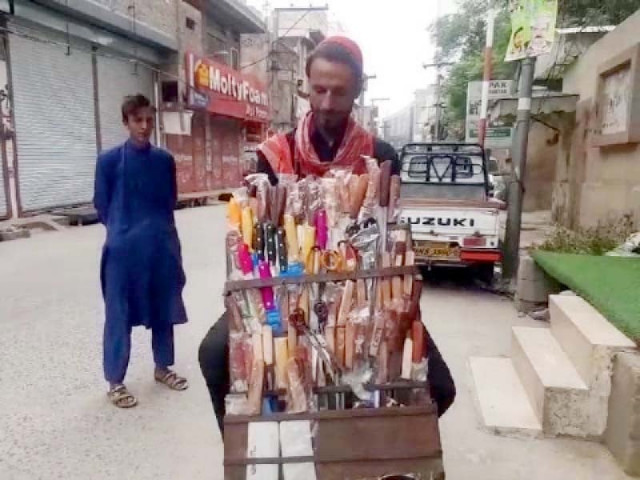The fading trade of mobile knife sharpeners
Modernisation casts a dark shadow on the century-old craft

In the narrow streets of Rawalpindi, a once-thriving trade that has endured for a century is now facing its last hurrah.
The age-old practice of installing a honing wheel on a bicycle to sharpen knives, axes, and scissors has seen a steady decline in recent years, as modern developments continue to reshape the landscape.
Originating a century ago, workers who lacked regular employment would mount a large honing wheel on a bicycle and roam the streets, offering their expertise in sharpening tools. They earned their livelihood by honing kitchen knives, household scissors, and small axes, heralding the arrival of Eidul Azha.
Until just two and a half years ago, their distinct cries resonated through the streets on a daily basis.
These skilled individuals would peddle through the neighbourhoods multiple times a day, as residents eagerly awaited their arrival with their blades in hand, ready for sharpening.
During the 1970s, these workers would even accept flour, sugar, and rice in exchange for their services if customers lacked cash.
They carried separate bags on their bicycles, accommodating the barter system. However, this tradition gradually waned after the mid-70s, giving way to a more conventional transaction system.
The advent of mobile phones and the rapid development of information technology have triggered a notable decline in this time-honored trade.
Now, the remnants of this once-thriving profession are limited to sporadic appearances solely before Eidul Azha, when cyclists with honing wheels mounted on their bicycles can still be spotted sharpening knives.
The process involves attaching a 6 to 8 inches honing wheel to the bicycle's handle. The cyclist balances the bicycle on a stand and peddles carefully, sharpening knives, scissors, axes, and other tools against the rotating honing wheel.
Charges for the service have seen an increase in recent times. A small knife sharpening now costs Rs40, while a large knife Rs60. Sharpening an axe costs Rs100, and a chopper or dagger, Rs130.
Traditionally, butcher shops were among the daily clients of these mobile sharpeners. However, butchers have now acquired their own large honing wheels, allowing them to independently sharpen their knives and cleavers. Furthermore, the introduction of new types of knives from China has brought affordable alternatives to the kitchens of households.
Published in The Express Tribune, June 27th, 2023.



















COMMENTS
Comments are moderated and generally will be posted if they are on-topic and not abusive.
For more information, please see our Comments FAQ